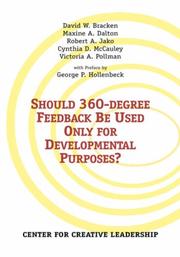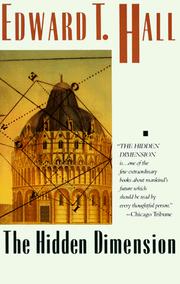| Listing 1 - 3 of 3 |
Sort by
|

ISBN: 1604917393 1882197313 1604915285 9781604915280 9781604917390 Year: 1997 Publisher: Greensboro, N.C. : Center for Creative Leadership,
Abstract | Keywords | Export | Availability | Bookmark
 Loading...
Loading...Choose an application
- Reference Manager
- EndNote
- RefWorks (Direct export to RefWorks)
Along with the growing use of 360-degree feedback in organizations today, there is much disagreement over how it should be employed: strictly to help the manager develop or also to help those who work with the manager decide such issues as pay and promotion? This publication features the insights of a group of experienced professionals on both sides of the issue. To set the stage, George P. Hollenbeck, a management psychologist and adjunct faculty member at Boston University's Graduate School of Management, discusses the popularity of 360-degree feedback today.
360-degree feedback (Rating of employees) --- Employees --- Rating of. --- Feedback Feedback --- Stratégies (management) Strategieën (management) --- Changement Verandering --- Appréciation des prestations du personnel Prestatiebeoordeling --- 360 degrés 360 graden --- Efficiency rating --- Employee appraisal --- Employee rating --- Employees, Rating of --- Performance appraisal of employees --- Performance evaluation of employees --- Performance rating (of employees) --- Personnel evaluation --- Rating of employees --- Service rating --- 360-degree assessment (Rating of employees) --- Feedback, 360-degree (Rating of employees) --- Multi-rater feedback (Rating of employees) --- Multi-source feedback (Rating of employees) --- Three hundred sixty degree feedback (Rating of employees) --- Upward feedback (Rating of employees) --- Peer review --- Rating of

ISBN: 0385084765 9780385084765 Year: 1969 Publisher: Garden City, N.Y. : Anchor Press : Doubleday,
Abstract | Keywords | Export | Availability | Bookmark
 Loading...
Loading...Choose an application
- Reference Manager
- EndNote
- RefWorks (Direct export to RefWorks)
An examination of various cultural concepts of space and how differences among them affect modern society. Introducing the science of "proxemics," Hall demonstrates how man's use of space can affect personal business relations, cross-cultural exchanges, architecture, city planning, and urban renewal.
Social psychology --- Sociology of culture --- Sociology of minorities --- Economic sociology --- National consumption --- Industrial psychology --- culturele antropologie --- territorium (mensen) --- antropologie --- 800.95 --- Architecture --- -City planning --- -Personal space --- 159.9 --- 13 --- 72.017 --- Ruimtegebruik --- Perceptie --- Omgevingsperceptie --- 72.01 --- 711.4 --- 711 --- Human territoriality --- Interpersonal relations --- Space --- Spatial behavior --- 800.95 Non-verbale communicatie --- Non-verbale communicatie --- Cities and towns --- City planning --- Civic planning --- Land use, Urban --- Model cities --- Redevelopment, Urban --- Slum clearance --- Town planning --- Urban design --- Urban development --- Urban planning --- Land use --- Planning --- Art, Municipal --- Civic improvement --- Regional planning --- Urban policy --- Urban renewal --- Architecture, Western (Western countries) --- Building design --- Buildings --- Construction --- Western architecture (Western countries) --- Art --- Building --- Psychological aspects --- Psychologie --- Cultuurfilosofie --- Ruimte (architectuur) --- Architectuurtheorie --- Architectuur (theorie) --- Stedenbouw (theorie) --- Ruimtelijke ordening (theorie) --- Government policy --- Management --- Design and construction --- Space perception. --- Space and time. --- Perception spatiale --- Espace et temps --- Comunicacao Rural. --- Personal space. --- Spatial behavior. --- Psychological aspects. --- #SBIB:309H53 --- Art Kunst --- Civilisation Beschaving --- Communication Communicatie --- Langage Taalgebruik --- Modes de communication Communicatiewijzen --- Relations humaines Menselijke relaties --- Personal space --- -304.23 --- Behavior, Spatial --- Proxemic behavior --- Space behavior --- Spatially-oriented behavior --- Psychology --- Space and time --- Niet-verbale communicatie --- Space perception --- CDL --- Space of more than three dimensions --- Space-time --- Space-time continuum --- Space-times --- Spacetime --- Time and space --- Fourth dimension --- Infinite --- Metaphysics --- Philosophy --- Space sciences --- Time --- Beginning --- Hyperspace --- Relativity (Physics) --- Spatial perception --- Perception --- Figure-ground perception --- Geographical perception --- Architecture, Primitive --- -Psychological aspects
Book
ISBN: 2738103308 9782738103307 Year: 1996 Publisher: Paris: Odile Jacob,
Abstract | Keywords | Export | Availability | Bookmark
 Loading...
Loading...Choose an application
- Reference Manager
- EndNote
- RefWorks (Direct export to RefWorks)
Le prix Nobel de chimie montre comment ses résultats les plus récents en physique théorique lui permettent de résoudre les problèmes qui rendent invraisemblables, malgré leur succès retentissant, tant la physique classique que la mécanique quantique : le paradoxe du temps et le paradoxe quantique.
Fysica [Mathematische ] --- Fysica [Wiskundige ] --- Mathematische fysica --- Physical mathematics --- Physics -- Mathematics --- Physics [Mathematical ] --- Physique -- Mathématiques --- Physique -- Méthodes mathématiques --- Physique théorique --- Wiskundige fysica --- Space and time --- Physique --- Espace et temps --- Philosophie des sciences --- --Science --- Space and time. --- Chaotic behavior in systems. --- Natural history. --- --Mathématique --- --Philosophy. --- Processus irréversibles --- Chaos (théorie des systèmes) --- Déterminisme (philosophie) --- Temps (philosophie) --- 113/119 --- -Space and time --- 124.1 --- Réflexions Het denken --- Futurologie Futurologie --- Sciences Wetenschappen --- Mathématiques Wiskunde --- Space of more than three dimensions --- Space-time --- Space-time continuum --- Space-times --- Spacetime --- Time and space --- Fourth dimension --- Infinite --- Space sciences --- Time --- Beginning --- Hyperspace --- Relativity (Physics) --- History, Natural --- Physiophilosophy --- Kosmologie. Natuurfilosofie. Filosofie van de natuur --- 113/119 Kosmologie. Natuurfilosofie. Filosofie van de natuur --- Science --- Philosophy. --- Chaotic behavior in systems --- Natural history --- 130.2 --- #GGSB: Filosofie --- #GGSB: Wetenschap --- Metaphysics --- Philosophy --- Natural science --- Biology --- Chaos in systems --- Chaos theory --- Chaotic motion in systems --- Differentiable dynamical systems --- Dynamics --- Nonlinear theories --- System theory --- Normal science --- Philosophy of science --- Temps --- Sciences naturelles --- Philosophie --- Physics --- Mathematical physics --- Sciences --- Physique mathématique --- Processus irréversibles. --- Temps. --- Espace et temps. --- Sciences naturelles. --- Philosophie des sciences. --- Philosophie. --- Chaos quantique. --- Temps (philosophie). --- Théorie quantique. --- chaos. --- histoire sciences. --- mathématique. --- nature. --- paradigme --- physique. --- science --- science. --- temps (durée). --- épistémologie --- évolution. --- Changement. --- Temps (durée). --- Incertitude --- Paradigme --- Changement --- Science. --- Filosofie --- Wetenschap --- Science - Philosophy. --- Mathématique --- Wetenschappen
| Listing 1 - 3 of 3 |
Sort by
|

 Search
Search Feedback
Feedback About UniCat
About UniCat  Help
Help News
News